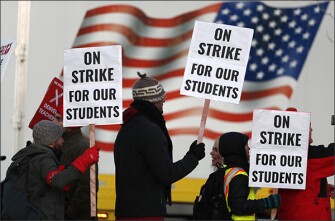
Denver teachers are on the picket lines for a third day, as officials from the school district and the teachers’ union return to the bargaining table.
Teachers are striking over the district’s performance-based compensation system, known as ProComp. Under ProComp, teachers can qualify for about 10 different financial incentives and bonuses, including for their students’ academic performance or for working in a hard-to-staff position or school. But teachers say the system is too confusing and unpredictable—the bonuses fluctuate from year to year and make it hard to plan financially.
See also: Denver Teachers to Strike Over Merit-Pay System
Both the union and the district agree that ProComp needs to be simplified, but they differ on the details. The teachers’ union has advocated for reducing cutting the number and size of incentives and putting more money into base salaries for teachers across-the-board. The district has agreed to give teachers a pay raise but wants to raise the annual incentive for teachers who work in high-poverty schools.
In an all-day negotiation session on Tuesday, the two sides made some headway, but failed to reach an agreement. This round of negotiations did not touch on bonuses, but centered around the salary schedule. Teacher salary schedules are made up of “steps” and “lanes"—steps for the number of years in the classroom, and lanes for educational attainment. Teachers receive a pay raise every time they move up a step or a lane.
According to Chalkbeat Colorado, the district’s latest offer has seven lanes, while the union’s proposal has eight. Last year, the district’s proposal had four lanes, and the union’s had 12.
“We exchanged proposals that are moving us closer and are hopeful that we will get to an agreement soon,” said Superintendent Susana Cordova and Denver Classroom Teachers Association President Henry Roman, in a joint statement. They added that they need “a little more time to resolve the outstanding issues.”
There are about 5,000 teachers in the Denver school district, and how many of them went on strike was a point of debate. On the first day of the strike, the district reported that about 2,600 teachers were absent from school for the strike. But the union said based on sign-in sheets and headcounts, there were about 3,800 teachers and support staff (like counselors, nurses, and librarians) on picket lines Monday. (The district reported similar numbers on the strike’s second day.)
This is Denver’s first teacher strike in 25 years. It’s part of a wave of teacher activism across the country that’s sweeping both blue and red states. In an interview with PBS NewsHour, I discussed the details of the activism in Denver and beyond:
Concern for Students With Disabilities
As the strike continues, some are concerned about the quality of instruction students are receiving. During the strike, schools are remaining open, staffed by substitutes and administrators.
On the first day of the strike, several high school students walked out of school. A student-filmed video shows students blasting music and dancing in the hallways. One student told the Denver Post: “Everybody’s screaming, ‘Pay our teachers.’ There’s no learning going on.”
Also on Monday, attorneys filed a federal lawsuit against the district on behalf of the more than 10,000 students with disabilities who are educated there. According to the Denver Post, the suit alleges that those students are likely to be harmed by a teacher strike more than other students. The lawsuit is seeking a court order to ensure the district provide the necessary special education services to students with disabilities—by having properly trained staff members care for those students instead of substitutes, avoiding merging classes and disrupting students’ routines, and communicating with parents.
The district has said the lawsuit is unwarranted, and students with disabilities are “well supported” in their schools by substitutes who have special education expertise.
Interestingly, there was a lawsuit filed on behalf of students with disabilities in the Los Angeles teacher strike, too—but it was filed by the district. The school district there had asked a federal judge to prevent special education teachers from going on strike, but the judge denied the attempt.
Image: Denver Teachers carry placards as they walk a picket line outside South High School on Feb. 11. —David Zalubowski/AP
